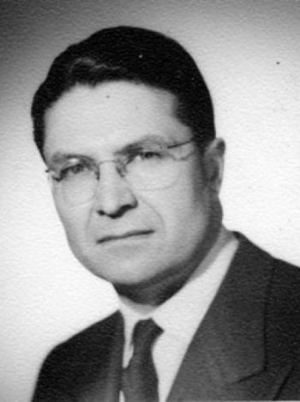Difference between revisions of "Jacques Piette"
(unstub) |
(tidy) |
||
| Line 16: | Line 16: | ||
}} | }} | ||
}} | }} | ||
| − | '''Jacques Piette''' was a French resistance leader during [[World War 2]] and politician of the [[Socialist Party (France)|Socialist Party]] (SFIO, from 1971 PS). A friend of [[Guy Mollet]], he attended several [[ | + | '''Jacques Piette''' was a French resistance leader during [[World War 2]] and politician of the [[Socialist Party (France)|Socialist Party]] (SFIO, from 1971 PS). A friend of [[Guy Mollet]], he attended several [[Bilderberg meeting]]s between 1955 and 1963. |
==Background== | ==Background== | ||
Latest revision as of 05:58, 11 December 2024
( politician) | |
|---|---|
 | |
| Born | 13 May 1916 Issy-les-Moulineaux, Hauts-de-Seine, France |
| Died | 2 April 1990 (Age 73) Boulogne-Billancourt, Hauts-de-Seine, France |
| Nationality | French |
| Party | French Section of the Workers' International |
Penta-Bilderberg French politician, confidant of Guy Mollet
| |
Jacques Piette was a French resistance leader during World War 2 and politician of the Socialist Party (SFIO, from 1971 PS). A friend of Guy Mollet, he attended several Bilderberg meetings between 1955 and 1963.
Background
The son of a worker and a worker himself, Jacques Piette pursued studies by correspondence, and obtained a bachelor of arts and a graduate diploma in law, then became a student of the Practical School of Higher studies. He joined the French Communist Party (PCF) in 1932. After February 6, 1934, the PCF refuses, at first, the rapprochement with the socialists (SFIO). Deeply shocked by this attitude, Jacques Piette left the Communist Party and joins the SFIO. From 1937 to 1938 he fought in Spain, on the side of the Republicans, during the Spanish Civil War. Then, he joined the SFIO's steering committee.
World war 2
Mobilized in 1939, Jacques Piette was a reserve officer cadet in Saint-Cyr and became a second lieutenant in May 1940. Hostile to the June 1940 Armistice with the Germans, he joined the Resistance at the end of the summer of 1940. The network to which he joins deals with intelligence, crossing the demarcation line and transporting weapons. Two years later, this network was dismantled by the Gestapo.
Jacques Piette then joined the large resistance network Organisation civile et militaire (CMO), as well as the Centurie network, of which he became head of the economic section in December 1942. In September, he joined the CMO's steering committee. The following month, he became military chief of the OCM for the North, Pas-de-Calais' and the Somme. From February to April 1944, he supervised two hundred sabotage operations in this capacity.
In March 1944 he became national military chief of the OCM. The information collected under his direction makes it possible to map the plan of the coastal fortifications along the English Channel. It was from this plan that the Allies chose the place of the landing in Normandy. In August, Jacques Piette participated in the liberation of Paris, then was appointed liquidator of the OCM[1] network and became secretary general for trade and economic organization at the Ministry of Industrial Production.
After the war
Upon liberation, Piette returned to his duties on the SFIO's steering committee and at the same time began a career as a high-ranking official. He was first inspector general of the Ministry of the Economy from 1947 and then chief of staff to Guy Mollet, the secretary general of the SFIO of which he was a close friend, when the latter was appointed minister in charge of European affairs in 1950. The following year, he was parachuted into the head of the National Aeronautical Construction Company of the North (SNCAN). He was dismissed by the government in 1955 following an audit that questioned his leadership[2].
Piette then devoted himself entirely to politics. He was elected deputy for Yonne from 1956 to 1958[3], returned to the steering committee of the SFIO from 1961 to 1969, and was mayor of Hénin-Beaumont (Pas-de-Calais) from 1969 to 1989 .
After the Epinay congress which saw the end of the SFIO in 1971, he continued to sit on the steering committee of the Socialist Party , first in the internal opposition, then in the majority of François Mitterrand. After the latter's election as President of France in 1981, Jacques Piette was appointed State Councilor in extraordinary service. He then chaired the National Industry Fund, from 1982 to 1986.
He died in 1990 of a heart attack.
His archives contains a large number of dossiers on his Bilderberg activities, including preparatory correspondence and summaries of discussions in the Steering Comittee[4].
Events Participated in
| Event | Start | End | Location(s) | Description |
|---|---|---|---|---|
| Bilderberg/1955 September | 23 September 1955 | 25 September 1955 | Germany Bavaria Garmisch-Partenkirchen | The third Bilderberg, in West Germany. The subject of a report by Der Spiegel which inspired a heavy blackout of subsequent meetings. |
| Bilderberg/1956 | 11 May 1956 | 13 May 1956 | Denmark Fredensborg | The 4th Bilderberg meeting, with 147 guests, in contrast to the generally smaller meetings of the 1950s. Has two Bilderberg meetings in the years before and after |
| Bilderberg/1959 | 18 September 1959 | 20 September 1959 | Turkey Yesilkoy | The 8th Bilderberg and the first in Turkey. 60 guests. |
| Bilderberg/1960 | 28 May 1960 | 29 May 1960 | Switzerland Bürgenstock | The 9th such meeting and the first one in Switzerland. 61 participants + 4 "in attendance". The meeting report contains a press statement, 4 sentences long. |
| Bilderberg/1963 | 29 March 1963 | 31 March 1963 | France Cannes Hotel Martinez | The 12th Bilderberg meeting and the second one in France. |
References
- ↑ http://sebastien-chochois.over-blog.com/pages/19192009_90_ans_de_gestion_socialiste_a_Outreau-1005233.html
- ↑ André Turcat, Pilote d'essais : Mémoires, vol. 2, le cherche midi.
- ↑ http://www2.assemblee-nationale.fr/sycomore/fiche/(num_dept)/5925
- ↑ http://www.lours.org/archives/defaultf6ba.html?pid=45